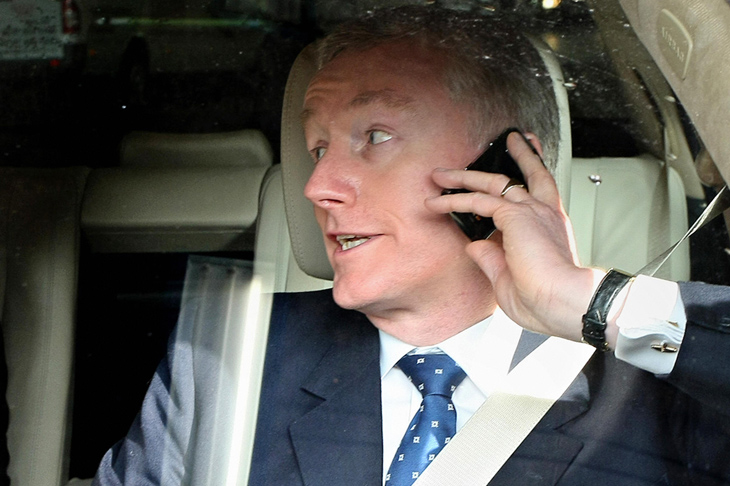‘Fred Goodwin off the hook again,’ declared the Scottish Daily Record. That neatly summed up one strand of sentiment behind the RBS Shareholder Action Group’s battle for compensation for losses incurred in the bank’s £12 billion rights issue in 2008 — preceding its £45 billion taxpayer bailout, in which any remaining shareholder value was largely wiped out. Investors who believe they were misled by RBS’s directors and the rights-issue prospectus have been campaigning for their money back ever since.
Most have already accepted a rather modest settlement, but some 9,000 have persevered with a case against the bank itself, Goodwin, former chairman Sir Tom McKillop and two other former directors, which was due in court last Monday for a lengthy trial, in which Goodwin et al would have been called to give evidence. That prospect was particularly relished by angry investors who resent Goodwin’s continuing £342,000-a-year RBS pension. But after a last-minute offer from RBS at almost double the previous settlement price per share, the trial was deferred. There’s still a chance it will begin later this week, but most observers now expect the case to settle.
Behind all this is an almighty row about legal costs. RBS deployed a team of lawyers that has run up fees of around £100 million — a figure even the judge Sir Robert Hildyard calls ‘staggering’. The claimants have wealthy backers but face the risk that if they lose they will be obliged to pay a portion of RBS’s costs. So the urge to see Goodwin wriggling on the hook at last is balanced against the urge to avoid that jeopardy.
If I were them, I would — perhaps ruefully — settle. Justice was not brought against the perpetrators of the financial crisis, in the courts or by public inquiry; too much water has now passed under too many bridges to put that right, though history will still judge. Goodwin is already an outcast for life, and his interrogation in this case was unlikely to ease anyone else’s pain. Better to take the money on the table and move on.
‘Cussed stick-at-it-ness’
The last time I saw Enda Kenny, the departing Irish Taoiseach, he was sitting on a garden bench, well after midnight, chatting affably to all-comers. A genial old-school Fine Gael man who inherited his Mayo seat from his father, he has achieved far more in office than even his own friends expected, having been widely derided for his ineffectual performance as opposition leader during the bailout crisis of 2010.
When he took office in 2011, the economy was in ruins and a ‘Troika’ of EC, IMF and ECB officials was effectively in charge. Yet Kenny presided over a recovery that has made Ireland’s the fastest-growing EU economy for the past three years, its debt-to-GDP ratio slashed, unemployment down from nearly 15 per cent to 6.4 per cent — and the ultra-low corporate taxes that make it so attractive for inward investment from the US and elsewhere maintained despite fierce pressure from Brussels.
Kenny’s amiability and optimism, combined with what one farewell dinner speaker last week called his ‘wonderful cussed stick-at-it-ness’, set a tone that persuaded his countrymen to accept austerity and get back to business after the craziness of the boom before the bust. Having lost popularity over non-economic issues, he’s stepping aside with his dignity largely intact and his reputation high abroad. I once tipped him for a top job in Brussels, but at 66 I’m guessing he’d rather sit chatting on a garden bench.
The Enda bet
In our Money section this week, Elliot Wilson suggests how to bet on Emmanuel Macron’s impact on the French economy by buying blue-chip shares and real estate. Only the boldest contrarian might have made a similar wager on Enda Kenny when he became Taoiseach in March 2011. But suppose you had constructed a proxy for the Irish economy that month by buying a €1 million Dublin townhouse, €1 million worth of farmland, a €1 million share portfolio divided equally between the food companies Glanbia and Kerry, the building materials maker Kingspan, the Bank of Ireland and Ryanair — and maybe a €100,000 job-lot of thoroughbred horses.
What would your Enda bet have yielded? Your house would have risen 40 per cent but your farm would still be worth much the same as you paid for it; your shares, apart from bombed-out Bank of Ireland, would have done you proud, rising to €3.5 million; and your horses’ keep would probably have cost more than their winnings. But in aggregate over six years you would almost have doubled your stake: a fair measure of Ireland’s recovery and Enda’s performance.
Would you repeat the bet on his likely successor, Leo Varadkar? With the pound’s Brexit-driven fall already hurting Irish exports, the unresolved issue of a potential ‘hard border’ with the North, and the implied Trump threat against direct investment in Ireland by US companies, it doesn’t look promising. But Varadkar is pro-British, pro-free-trade and younger than Macron — and fortune favours the brave.
Not whether but when
One European job I wouldn’t urge Enda to take is that of chief negotiator of a new debt plan for Greece, though he’s well qualified to do it. Talks stalled again on Monday; Jeroen Dijsselbloem — the Dutch finance minister currently clutching this chalice — could say no more than that he hoped for a deal in June, ahead of the deadline by which Greece needs more bailout cash in order to meet scheduled debt repayments. Meanwhile, few reforms demanded of Greece in the 2015 EU bailout agreement have happened, and the IMF won’t put its name to the fiasco until there is ‘a credible strategy to restore debt sustainability’ — which means the sort of debt write-off the Germans refuse to contemplate. Another Greek crisis lies ahead, more damaging for all than the last one. The only question is when.







Comments